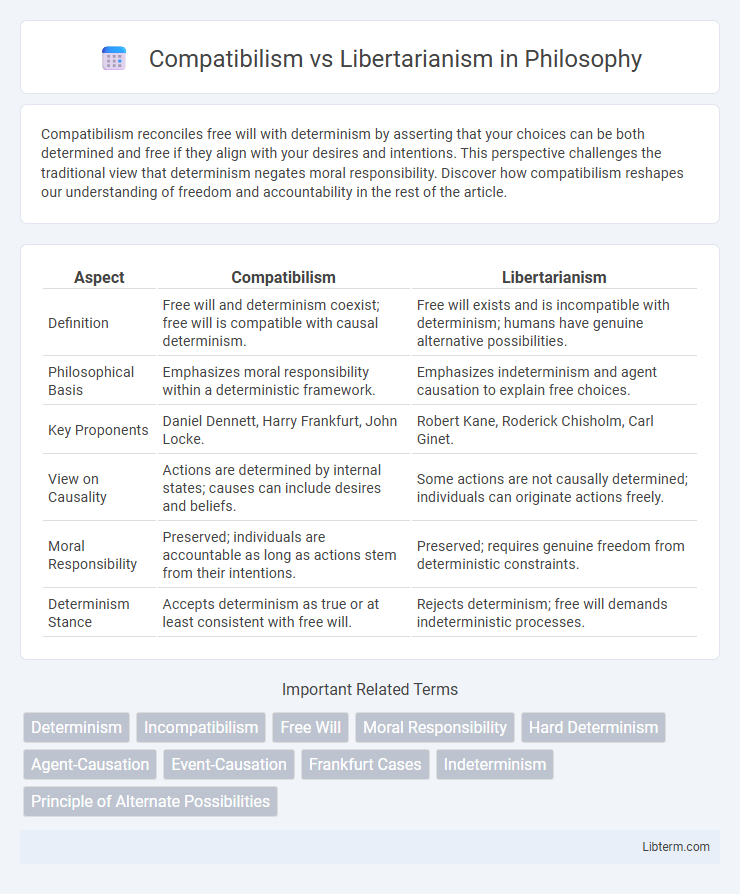Compatibilism reconciles free will with determinism by asserting that your choices can be both determined and free if they align with your desires and intentions. This perspective challenges the traditional view that determinism negates moral responsibility. Discover how compatibilism reshapes our understanding of freedom and accountability in the rest of the article.
Table of Comparison
| Aspect | Compatibilism | Libertarianism |
|---|---|---|
| Definition | Free will and determinism coexist; free will is compatible with causal determinism. | Free will exists and is incompatible with determinism; humans have genuine alternative possibilities. |
| Philosophical Basis | Emphasizes moral responsibility within a deterministic framework. | Emphasizes indeterminism and agent causation to explain free choices. |
| Key Proponents | Daniel Dennett, Harry Frankfurt, John Locke. | Robert Kane, Roderick Chisholm, Carl Ginet. |
| View on Causality | Actions are determined by internal states; causes can include desires and beliefs. | Some actions are not causally determined; individuals can originate actions freely. |
| Moral Responsibility | Preserved; individuals are accountable as long as actions stem from their intentions. | Preserved; requires genuine freedom from deterministic constraints. |
| Determinism Stance | Accepts determinism as true or at least consistent with free will. | Rejects determinism; free will demands indeterministic processes. |
Introduction to Compatibilism and Libertarianism
Compatibilism asserts that free will and determinism are compatible, proposing that individuals can act freely even within a deterministic framework. Libertarianism argues for free will as fundamentally incompatible with determinism, emphasizing the existence of genuine, uncaused choices. These opposing views form the core debate in the philosophy of free will, influencing discussions on moral responsibility and human agency.
Defining Free Will: Compatibilist Perspective
The compatibilist perspective defines free will as the capacity to act according to one's desires and rational deliberations without external coercion, emphasizing compatibility with deterministic laws. This view asserts that freedom hinges on internal motivations aligning with one's character, rather than on indeterministic metaphysical freedom. By grounding free will in psychological autonomy and control over actions, compatibilism challenges the necessity of absolute metaphysical libertarian freedom.
Core Principles of Libertarianism
Libertarianism asserts that individuals possess free will that is not determined by prior causes or external constraints, emphasizing agent causation as central to moral responsibility. Core principles include the rejection of determinism, the belief in genuine choice, and the assertion that individuals have ultimate control over their actions, making them accountable for their decisions. This contrasts with Compatibilism, which holds that free will can coexist with determinism by redefining freedom as acting according to one's desires without external coercion.
Determinism Explained: The Philosophical Backdrop
Determinism posits that every event, including human actions, is causally determined by an unbroken chain of prior occurrences, challenging the notion of free will. Compatibilism reconciles determinism with free will by defining freedom as acting according to one's desires without external coercion, even if those desires have deterministic origins. Libertarianism rejects determinism, asserting that humans possess genuine free will that is not pre-determined, allowing for true alternative possibilities in decision-making.
Key Differences Between Compatibilism and Libertarianism
Compatibilism posits that free will and determinism coexist, arguing that human actions can be both determined and free if they align with internal motivations rather than external coercion. Libertarianism asserts genuine free will, emphasizing that individuals have the capacity to make undetermined, spontaneous choices independent of causal chains. The core distinction lies in compatibilism's acceptance of determinism in decision-making, while libertarianism denies determinism's influence on free will, advocating for indeterminism.
Major Philosophers and Their Views
Compatibilism, championed by philosophers such as David Hume and Daniel Dennett, asserts that free will is compatible with determinism by redefining free will as acting according to one's desires without external coercion. Libertarianism, supported by thinkers like Robert Kane and Roderick Chisholm, argues that free will requires genuine indeterminism, insisting individuals have the power to make choices independent of deterministic causation. Hume's empirical approach contrasts with Kane's emphasis on ultimate responsibility and Chisholm's agent causation theory, positioning these views at the heart of the ongoing debate on moral responsibility.
Criticisms of Compatibilism
Compatibilism faces criticism for allegedly redefining free will to fit determinism, which some argue undermines genuine moral responsibility by ignoring the necessity of alternative possibilities. Critics claim compatibilists fail to address the intuitive conflict between determinism and freedom, resulting in a superficial reconciliation that avoids key metaphysical challenges. This debate remains central in philosophy of mind and ethics, highlighting ongoing disputes over the nature of autonomy and accountability.
Challenges Facing Libertarianism
Libertarianism faces significant challenges including the problem of free will's coherence with physical determinism and the lack of empirical support for indeterministic choices. Critics argue that libertarian free will struggles to explain how uncaused decisions can be genuinely free and responsible without randomness undermining control. This tension between metaphysical freedom and scientific understanding presents a major obstacle to the widespread acceptance of libertarianism in contemporary philosophy.
Implications for Moral Responsibility
Compatibilism asserts that free will is compatible with determinism, thereby supporting the idea that individuals can be held morally responsible for their actions even if those actions are determined by prior causes. Libertarianism claims that free will is incompatible with determinism, emphasizing that genuine moral responsibility requires agents to have the ability to act otherwise in identical circumstances. These differing views influence legal and ethical frameworks by shaping notions of accountability and the justification for praise or blame.
Contemporary Debates and Future Directions
Contemporary debates between compatibilism and libertarianism center on the reconciliation of free will with determinism, emphasizing recent neuroscientific findings and their implications for moral responsibility. Philosophers increasingly explore hybrid models that integrate elements of both positions, aiming to address challenges posed by quantum mechanics and emergent complexity. Future directions anticipate advances in cognitive science and artificial intelligence to redefine autonomy and ethical accountability in dynamic, probabilistic frameworks.
Compatibilism Infographic

 libterm.com
libterm.com